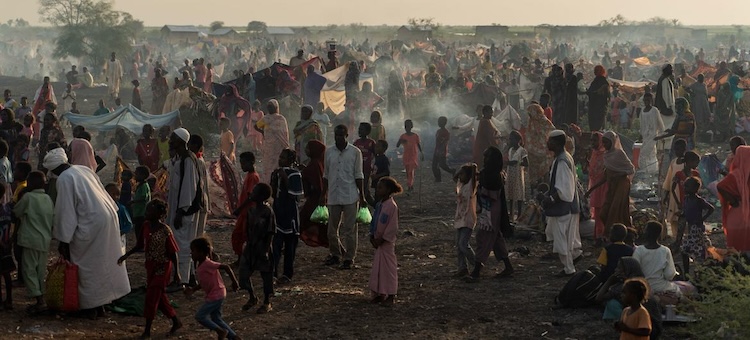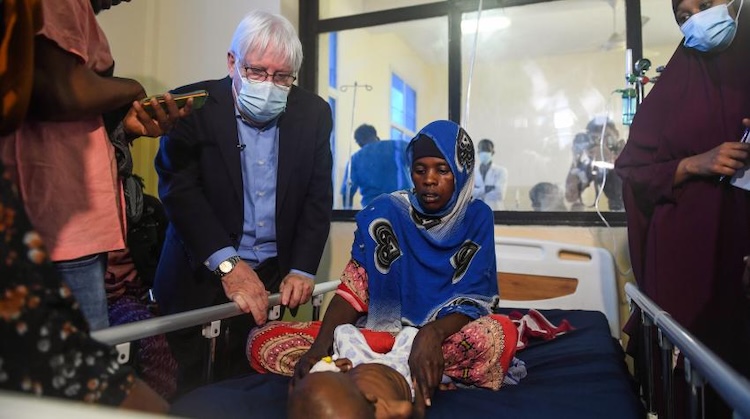By Kasmira Jefford
GENEVA | 12 July 2024 (IDN | Geneva Solutions) — The United Nations’ top aid chief stepped down last month at a time of huge pressure on the humanitarian sector to meet record global needs. In his last briefing with journalists, Martin Griffiths said it would be up to his successor to lead a radical rethink of how aid is funded.
In July 2021, days after taking up his new post as the UN’s humanitarian chief and emergency relief coordinator, Martin Griffiths arrived in Ethiopia, where nine months of civil war between the federal government and forces in its northernmost Tigray region had descended the country into bloody chaos.
The situation was dire. Schools, hospitals, vital agriculture and water systems had been destroyed and essential services like fuel and communication were on the brink. “It was heartbreaking to see the scale of devastation,” he said at the time, after visiting the village of Hawzen, where he met with a family whose crops and home had been looted and burnt down.
As the threat of famine loomed large over the besieged region, humanitarian access would become increasingly difficult and dangerous amid reports of drivers being attacked and trucks going missing, in what his office condemned as a “de-facto aid blockade”.
But it was only the start of his term in the high-pressure job as head of the UN Office for the Coordination of Humanitarian Affairs (OCHA), which would be marked by escalating large–scale conflicts, international humanitarian laws being sidelined and growing challenges in getting aid over the front lines.
Since then, new wars in Ukraine, Sudan and Gaza have unfolded, which, compounded by other crises like climate change, have brought the number of people in need of life-saving humanitarian aid worldwide to nearly 300 million.
For Griffiths, who stepped down last week for health reasons, “nothing quite prepared me for the breadth and depth of human suffering I witnessed in my three years as humanitarian chief,” he said in a recent piece for The New York Times.
The British former diplomat, who started his career in humanitarian response working for agencies including UNICEF and Save the Children, has spent much of it as a conflict mediator, co-founding the Centre for Humanitarian Dialogue in Geneva, one of the first organisations to specialise in private diplomacy.
His roles for the UN included advising several UN special envoys for Syria and serving as UN special envoy to Yemen, where he supervised a deal in 2018 between the Houthis and the Yemeni government for the exchange of some 7,000 prisoners.
Reputed as a skilled negotiator, Griffith’s nomination to the emergency coordinator role marked a return to the field of humanitarian response. During his last weeks on the job, Griffiths has been active in voicing his concerns over the future, and about “the angry world we live in” as countries increasingly resort to war instead of dialogue and diplomacy.
“The crisis response these days tends to put a huge onus on humanitarian response when diplomacy, mediation, peace-making, dialogue, neighbourliness should be at the forefront,” he told the association of correspondents accredited to the UN in Geneva (ACANU), in his last briefing to the press.
‘Shameful’ humanitarian shortfall
The humanitarian burden is of mammoth proportions, with the UN appealing for $48.7bn to help people affected by crises, including in the Occupied Palestinian Territories, Sudan and Ukraine. But halfway through the year, its budget is only 18 per cent funded—a fact Griffiths deplored as “historically shameful”.
Though easy to point the finger at the UN, Griffiths said the huge funding deficit was the world’s collective responsibility. “It’s really important…not to talk about the perils of this world as a failure of multilateralism. It’s not a failure of multilateralism; it’s a failure of values and commitments.”
With needs skyrocketing and donors retrenching, Griffiths said it would be up to his successor to lead a radical rethink of how humanitarian assistance is funded. “The disparity…between the amount of money spent on war and the amount of money spent on humanitarian is so gross, such a glaring disparity, that it is a shame. So, it’s clear we need different ways of levying funding for humanitarian aid.”
An empty seat
No permanent successor has yet been named to take Griffiths’s place, sparking concerns among the humanitarian community at a time of overlapping crises.
Joyce Msuya, his deputy, has stepped in as acting chief as the UN secretary general António Guterres continues his search for Griffiths’ successor.
A post created relatively recently in 1991 compared with other high-profile UN roles, the Emergency Relief Coordinator is the most senior UN official dedicated to humanitarian affairs, acting as the main go-to person between governments and non-governmental organisations and reporting directly to the secretary general.
During his time in the role, Griffiths was instrumental in brokering the now-defunct Black Sea Grain deal, which he conceded was a “disappointment”. Despite this, he said it was a rare example of two sides coming together to do something for global benefit, compared with other mediation efforts he has been involved in, typically centring on ceasefires or local procurement. “It was a reminder of the power of humanity, even in these parlous times, as a way of bringing people together.”

He has also been central in leading the UN’s aid efforts and advocating for more safety guarantees in Gaza, as well as trying to broker humanitarian talks between the generals of Sudan’s two warring sides.
He leaves without an outcome in Sudan, with prospects of peace after more than a year of war remain nowhere in sight, while more than 10 million people are displaced, and UN agencies continue to struggle to provide relief.
“Those two people (Sudanese army general Abdel Fattah al-Burhan and Mohamed Hamdan “Hemedti” Dagalo of the Rapid Support Forces) have a responsibility to enable the international community to deliver aid to their people. So far, we haven’t seen that responsibility.”
Though stepping down due to the toll long Covid has taken on his health, the 72-year-old said he would continue to work independently as a humanitarian diplomat based in Geneva.
Humanitarian diplomacy—whether negotiating access, promoting humanitarian principles, or engaging in mediation efforts to prevent conflicts—“remains central to the way we respond to crisis”, he told Geneva Solutions.
Griffiths’s view on global prospects is bleak—he warned of the “potentially apocalyptic” impact the spread of the Israel-Hamas war to Lebanon could have on the region and the rest of the world. In Gaza, his hopes for a breakthrough in humanitarian access were no less muted.
But Griffiths said he also wanted to balance this by “paying respect to the enormous courage we see each day by communities and civil society”.
“We need to recognise that the humanity that binds us all is no less a deep well now than it ever has been, and it has been my job to bear witness to that.”
Photo: Martin Griffiths, under-secretary general for humanitarian affairs and emergency relief coordinator, speaks to journalists during a press conference at the UN in Geneva on 26 June 2024. (Keystone/Martial Trezzini)
Geneva Solutions content is licensed under Creative Commons BY 4.0.


